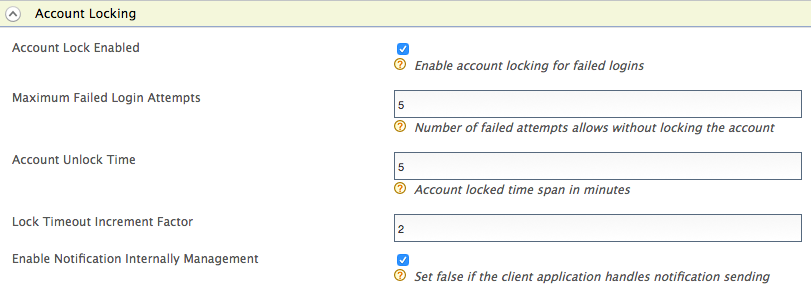User Account Suspension¶
The WSO2 Identity Server allows you to set up account suspension to lock accounts that have been idle for a pre-configured amount of time.
Prior to account suspension, set up the notification system to send a warning notification to the user announcing that the account will be suspended. For instance, if users have not logged in to their accounts for 90 days, they can be notified that their accounts will be suspended within the next 7 days if there continues to be no activity, after which, the accounts will be suspended.
Note
Once an account is suspended, only an administrative user can unlock the account.
Setting up account suspension notifications¶
The notification module is a scheduled task that runs daily. It fetches users from the user store that are idle and eligible to receive a warning notification based on the last logged-in time. The scheduled task that checks for idle accounts is common to all tenants.
Before you begin
Ensure that the identity listener with the
priority=50 is set to false and that the "
identity listener with the
priority=95 is set to true by adding the following configuration in the
<IS_HOME>/repository/conf/deployment.toml file.
[event.default_listener.identity_mgt]
priority= "50"
enable = false
[event.default_listener.governance_identity_mgt]
priority= "95"
enable = true-
Enable notifications for account suspension by setting the following property to true in the
<IS_HOME>/repository/conf/deployment.tomlfile.[identity_mgt] inactive_account_suspention.enable_account_suspension = true -
To define the start time of the scheduled task, configure the following property in the
<IS_HOME>/repository/conf/deployment.tomlfile. The task runs daily at the trigger time that you configure here.Tip
Set the value in hh:
mm: ss format. If you set it in the wrong format or do not set a value, the default value, which is 20:00:00, applies. [identity_mgt] inactive_account_suspension.trigger_notifications_at = "20:00:00" -
Add the following property under all the relevant userstores that you are using in the deployment.toml file.
LDAP Userstore
[user_store] notification_receivers_retrieval_class = "org.wso2.carbon.identity.account.suspension.notification.task.ldap.LDAPNotificationReceiversRetrieval"JDBC Userstore
[user_store] notification_receivers_retrieval_class = "org.wso2.carbon.identity.account.suspension.notification.task.jdbc.JDBCNotificationReceiversRetrieval" -
Optionally, you can configure the following email properties to receive email notifications in
<IS_HOME>/repository/conf/deployment.toml[output_adapter] email.from_address = "[email protected]" email.username = "abcd" email.password = "xxxx" email.hostname = "smtp.gmail.com" email.port = 587 email.enable_start_tls = true email.enable_authentication = trueTip
You can customize the emails that are sent to the user by editing the pre-configured email templates.
- The email template used to send an email when the account has been idle for some time is the idleAccountReminder template.
- The template used to send an email when the account has been locked is the AccountLock template.
For more information on how to edit and customize the email templates, see Customizing Automated Emails.
Configuring account suspension settings¶
- Start the WSO2 IS and log into the management console using your tenant credentials.
- Click Resident under Identity Providers found in the Main tab. Expand the Login Attempts Security tab.
-
Expand the Account Lock tab and select the Lock user accounts checkbox. Click Update to save changes.
Field Description Sample Value Account Lock Enabled This specifies whether account locking should be enabled for failed logins. Maximum Failed Login Attempts This specifies the number of consecutive attempts that a user can try to log in without the account getting locked. For example, if the value you specify is 5, the account gets locked after 5 consecutive failed login attempts. 5 Lock Unlock time This specifies how long the account is locked for. The time span is given in minutes. 5 Lock Timeout Increment Factor This specifies the increment factor of the lock timeout. If the lock timeout increment factor is set to 2, then the timeout increments by 2 to the power of the number of failed login attempts. [Timeout increment = (Lock Timeout Increment Factor)(Number of Failed Attempts)] (If the number of failed login attempts is 3, timeout increment is 23=8) 2 Enable Notification Internally Management The field is set false if the client application handles notification sending. False 
-
Expand the Account Management Policies tab.
-
Expand the Lock Idle Accounts tab and select Enable. Fill in the following fields and click Update.
Field Description Sample Value Lock Account After This specifies the total number of days after which the account will be locked. In this case, if the account is idle for 90 days, it will be locked. 90 Alert User in This specifies the number of days (in a comma separated list) after which the user is sent a warning notification informing him/her that the account is about to be locked. In this case, the user will receive multiple notifications, one notification after 30 days, the next after 45 days etc. Finally if it reaches 90 days with no activity from the user, the account will be locked. 30,45,60,75 
Troubleshooting Tips
If you want to troubleshoot this feature, add the following property to
the log4j2.properties file found in the <IS_HOME>/repository/conf/ folder to receive DEBUG
logs.
logger.account-suspension-notification-task.name = org.wso2.carbon.identity.account.suspension.notification.task
logger.account-suspension-notification-task.level = DEBUGRelated Links
See Configuring Claims for more information on how to store the claim values in the user store.